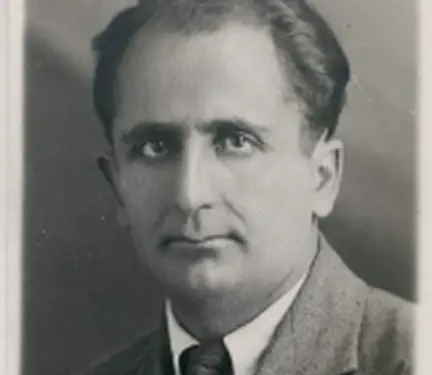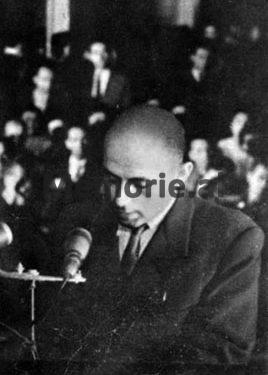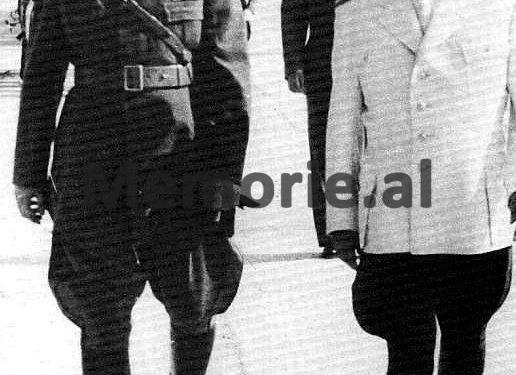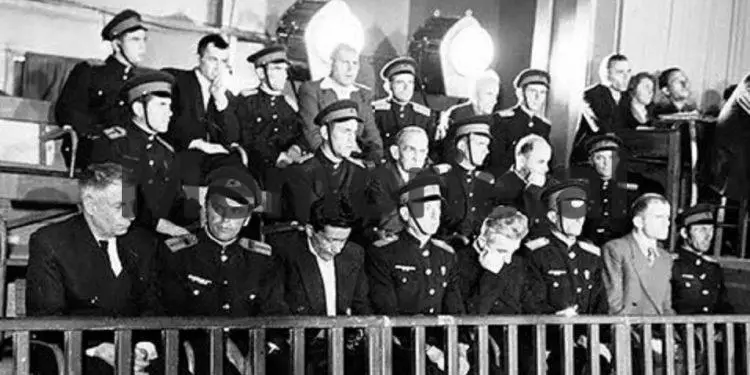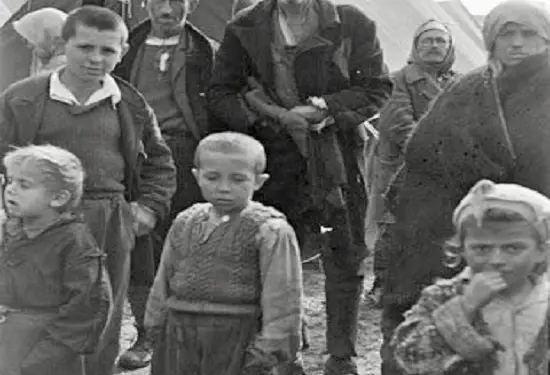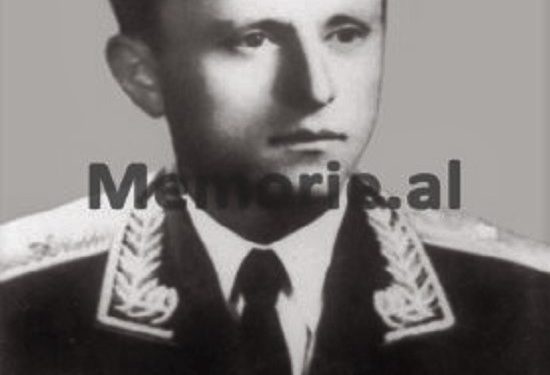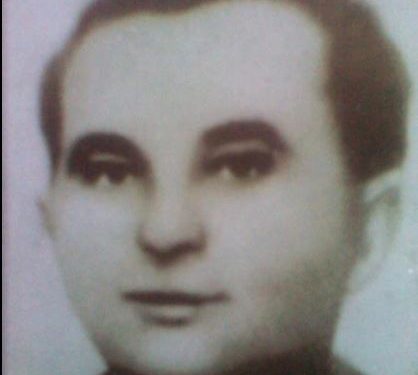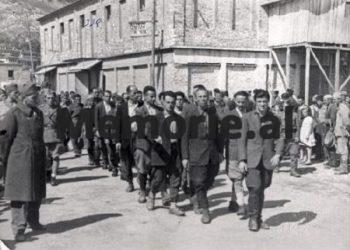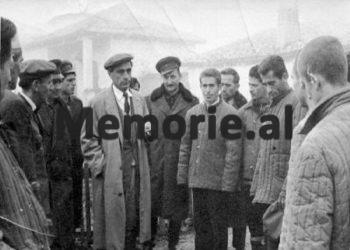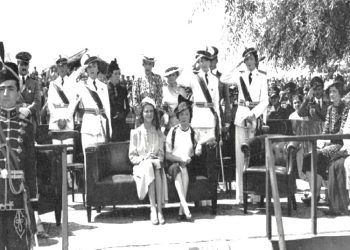By Genc Korça
The first part
-The “Red Elephant” syndrome, cross-legged in the Albanian reality! –
Memorie.al / The 20th century entered fiery optimism. Political thinkers across Europe saw ranks of industrial workers rallying around the banners of socialism across the continent. Thus, it was quite clear to conclude that none of the socialist workers, whether in France, Germany or elsewhere in the ranks of the industrialized nations, could raise a rifle against other socialists, no matter on which side of the border they might be. . But at this time, Duke Ferdinand of Austria was shot dead in Sarajevo and the First World War put aside the pacifist utopia. Before the end of the war, the Soviets could begin building a workers’ paradise, drowning the Tsarist regime in blood, as well as any opposition to Marxism-Leninism. In addition, Germany was able to throw off the poverty and turmoil of the aftermath of World War I and elect Adolf Hitler as chancellor. Germany was able to unite closely under the banner of the National Socialist Party and rise to the level of a world power in just six years.
The world had to pay a high price, due to the aggressiveness of the two dictatorial regimes. The political casualties of these dictatorships and the great damage caused by the war that followed, caused the populations of some small countries to unite. The 20th century, instead of bringing peace, turned into the bloodiest century since the creation of the world. However, the darkness of war was illuminated from time to time, raising up examples of bravery and compassion. At the beginning of World War II, there were about 200 Jews living in Albania.
In addition to the small group of Jews born or already living in Albania, their number increased when King Zog ordered the Albanian authorities to issue entry visas to German Jews, at a time when only a few other countries opened the way for refugees. Jews who came from Germany.
During the war, another 1,800 Jews from Western Europe and the former Yugoslavia passed through its borders. That they all survived, thanks to the efforts of the Albanian authorities and the generosity of the Albanian people, who offered them shelter and support. During the time when Mustafa Merlika-Kruja was prime minister, German representatives provided the Albanian government with the names and addresses of Jews living in Kosovo.
Prime Minister Kruja ordered the government offices to provide the Jews with Albanian identity cards and to allow them to move to other places of residence. The operation was carried out within a few weeks, and the German authorities were informed that the search for Jews, according to previous addresses, had failed and, therefore, was called over. Successive governments followed the same course until the end of the war.
Aware of this, on June 27, 2006, Senators Schumer of New York and McCain of Arizona presented Resolution 521 IS for approval by the Senate, praising the Albanian people on the occasion of the 61st anniversary of the liberation of the Jews from the Nazi death camps. . 11 years ago, Yad Vashem, the Museum of Remembrance of Martyrs and Heroes of the Holocaust in Jerusalem, presented Albania as one of the fairest of all nations!
Recently, its director, Dr. Mordechai Paldiel, recalled the heroism of the Albanians, that they had protected the Jews, thanks to their oath, the code of honor that requires the Albanians to protect the life of anyone who seeks refuge, even with their own life. Dr. Paldiel found this to be very fair. Besa Albanian is the Albanian word of honor.
In Greece, which is not known for its pro-Albanian sympathies, a person with a strong sense of honor is told to have faith, which requires no further explanation. In fact, there is an Albanian code of honor, a systematic and comprehensive body of laws. The northern Albanians developed the code of Lekë Dukagjini during the Ottoman occupation, while the state administration failed to ensure law and order in the northern parts of the country.
It was this system that brought security to travelers seeking shelter and food, including those seeking shelter from the Turkish government. This provided a haven for each individual, even though the asylum seeker was involved in a blood feud, directly with his hosts. Besa was the word of honor that sealed the oral agreement between the parties.
Needless to say, the Albanian communist regime fought the code and its enforcers, with ferocity, since it could not tolerate loyalty to a source of a system outside the Party. If there is no God, why then did the Party fight with all its might against the three religious’ beliefs in Albania?! Why did she execute most of the Catholics during the first five years of her coming to power?!
Why did she persecute and eliminate many clerics of the Catholic and Muslim faiths? Why did the party outlaw all religious beliefs in 1967 and why did it turn Christian and Muslim places of worship into granaries, cinemas, gymnasiums, dance halls, etc.?! For the same reasons, she fought the Canon of Lekë Dukagjin.
The Communist Party fought all faiths, because they were connected to a system of principles of morality and faith above and beyond the treacherous paths of red politics. Here is an example of how the Albanian Communist Party pursued the physical destruction of the Clergy: a survivor of the religious purge, Father Shtjefën Kurti, was sentenced to 25 years in prison.
Immediately after the execution of the sentence, a farmer asked Father Kurt to baptize his newborn son. The priest baptized the child, but he was arrested again and shot. To this day, it is not clear whether the farmer was innocent or was recruited by the authorities to trap the priest!
The Soviet Communist Party and its counterparts in satellite countries found other ways to disrupt religious communities without destroying them. When convenient, these faith forces can always be dusted off and used in times of crisis, as was done in the USSR (Union of Soviet Socialist Republics) during World War II. This did not happen in Albania, where ideological extremism and not tolerance could rule for about half a century.
V. Molotov, the foreign minister of the former Soviet Union, once said that in the 20th century, all roads lead to communism. Many followed this path across continents, due to its ideological allure, which, like the sirens of Greek mythology, hypnotized travelers, only to destroy them, sooner or later, on the rocks of reality.
Some communists were idealists who cherished the promise of universal equality, in a classless society where the individual would be provided for according to his needs, not according to his contribution. And what could be more humane than that? One of these individuals was Llazar Fundo, an early Albanian communist. During King Zog’s regime, he was exiled abroad. I met him in 1939, in the village of Dardhë, and I was impressed by the warmth and friendliness of this tall, blond and blue-eyed Albanian.
What surprised me even more was that my father, a strong opponent of communism, called his friend Zai Fundon! When the communist forces took the mountains, he joined them, against the invaders. Enver Hoxha knew from before, that Fundo was an idealist, who could oppose the kind of plan that Enver had for the Albanians. Word got out that one night, while Fundo was sleeping with his comrades-in-arms by a campfire, he had been shot to death on orders from headquarters.
Another communist with a long tenure was the sergeant in charge of guarding our prison, in the political isolation in Tirana, in 1945. He had an average height, was dark, dry and strong. He was also soft-spoken and was not one to cause the prisoners any particular discomfort. One day, we had re-entered the prison, after our morning walk. When the guards locked us in, he stayed inside the prison. We looked at him with surprise and thought he might be there for a search, as part of the prison routine.
But he told us that already, he was a prisoner like us! “Many of you are hoping and praying that your day will come when you are free. That day may come. Yes, my day came and…I found myself in prison”! he told us. Within an hour he left there and disappeared, never to be seen again…! The internal struggle for power within the Communist Party of Albania started a long time ago.
In 1942, some Albanian communists from the highest ranks of the Communist Party were betrayed to the Italian occupation forces. One of the first victims was Qemal Stafa, killed during a gunfight with Italian forces. When he died, he was the leader of the Albanian Communist Youth. The information about his death led to Enver Hoxha, who considered him capable and charismatic, which means: a future rival.
Other potential challengers to Hoxha would disappear in the following years. Not all those who joined the party in the early days of its creation were idealists. Some of them enlisted because, under the guise of ideology, they could exercise their killer instincts and turn crime into a career. Such individuals formed the killing squads, whose target was the Albanian patriots.
Hysen Mushqeta was a successful businessman who invested his profits for the good of the country. He offered me free land and a house in the country that I wanted, if I would study agriculture and be willing to teach farmers modern farming methods. Every year, he gave a dowry to two girls from poor families so they could get married. A team of assassins attacked him in Durrës.
He survived the assassination attempt and was taken to a hospital in Tirana, where he began to recover. He died in the hospital after drinking poisoned milk given to him by communist nurses. According to Napoleon, the ideologues conceived the revolution, the idealists made the war and the masquerades stole the victory. When the German forces withdrew from Albania, it was precisely the time of the masquerades, to insert their claws and teeth into the reins of power. The bloodshed began a few months after the communists took power.
The first categories to be marked for destruction were the former political leadership and the Clergy, especially the Catholic. Leaders of other faiths would soon follow. Koçi Xoxe became the number two man, after Enver Hoxha. A tinsmith from southern Albania, he was seen by many as the favorite of the proletarian Yugoslavs behind the throne of bourgeois Enver. In the summer of 1945, as the head of the Special Court, he handed down strict sentences to the former Albanian political elite.
The first major purge of Red Party ranks came in 1948, just four years after the Communist Party had come to power, when Yugoslavia’s Tito broke with Moscow. Until then, Tito had been the “Big Brother of Albania”, and the ties between Albania and communist Yugoslavia were described as “eternal bonds of friendship and brotherhood”, forged during the war against fascism. Now, Tito’s name became hated and Koçi Xoxe, supposedly the man of Belgrade in Tirana, was executed, as the most prominent victim of this “cleansing” of the ranks of the Party.
Over the years, other purges took place, accompanied by casualties. Enver’s victims were numerous, from Prime Minister Mehmet Shehu, to Interior Minister Kadri Hazbiu, from Rear Admiral Teme Sejko, to General Beqir Balluku. Some of the top leaders or functionaries of the red nomenklatura, such as Mehmet Shehu, committed suicide. Others were executed as foreign spies, after mock trials, like Rear Admiral Teme Sejko. Thus, Enver Hoxha decided to fabricate a Cham conspiracy to unleash another wave of terror.
The Chams were refugees from the Albanian population in northern Greece. General Hilmi Seiti, a Cham and head of State Security in Shkodra, was said to have been asked to claim to have been a member of such a plot. He would go through a rigged trial and then be released. He refused and died after drinking a cup of poisoned coffee. Rear Admiral Teme Sejko, also a Cham, accepted the proposal and was immediately arrested.
During the proceedings, he was accused of having been in contact with the US 6th Fleet in the Mediterranean through Haki Rushit. Rushiti was a Cham refugee whom I had befriended in Greece and who, at the time of the trial, was living in New York. I happened to be in New York for my work and decided to visit him. When I gave the taxi driver his address, he saw me and said, “Are you sure this is the correct address”?! This residence is in a very bad neighborhood”?!
He was right. When we got there, I asked him to come pick me up in two hours, so I wouldn’t have the chance to stand on a street corner, waiting for a taxi. The building in which my friend lived was almost dilapidated and had no elevator. I climbed the stairs to the fourth floor. My friend’s apartment was kind of crushed by the rest of the building. I found Haki, in very low health.
He had trouble breathing and suffered from heart disease, which made it impossible for him to leave the apartment, due to climbing many stairs. Unable to work, he had to live only on the income of his wife, who sewed clothes in the district tailor shop. According to the prosecutor of Tirana, this man – in a serious state of health and unable to move, – had been the liaison between Rear Admiral Sejko and the 6th American Fleet.
Isn’t that hard to believe?! After a short trial, Teme Sejko was sentenced to death and executed. His wife killed herself by jumping from a high-rise window. The son was arrested and shot, after being accused of blowing up the “Mao Ce Dun” Textile Factory in Berat, where they were interned. After him, Teme Sejko’s other son was arrested and sentenced to several years in political prison.
Periodic purges were intended to keep Party members and the rest of the population under control. These purges hit a large number of victims, from high officials and Party leadership, to ordinary communists, from teachers, to waiters and workers. Most of them were not party members. In addition to the suffering and cost in people’s lives, these waves of terror also stifled free thought and individual initiative.
Project proposals typical of the communist regime required long lead times, large amounts of funding, and considerable manpower, so that, after the inevitable shortages, the project’s success—and more importantly—survival of those involved, to be sure. It is suspected that systematic psychological terror, over 47 years, paralyzed the nation.
Already after the nominal fall of Communism, it has become clear that the prolonged attacks on the moral integrity of the nation have proven to be more damning than the death and destruction inflicted upon it. During the long years of communist rule, security and survival were, above all, on the minds of the people. The party offered shelter, but never immunity. She encouraged individual careers and gave her students the chance to pursue their studies, always a privilege and never a right.
She made these young people study law, political science and other fields reserved for her pets. Those belonging to the upper class in this “classless society” were even allowed to study abroad. These students, regardless of their high rank in society, had to kneel as soon as they returned to their place. Everyone had to proclaim Albania’s superiority over the West, in every way, regardless of the freedoms and comforts the students had enjoyed during their college years.
By the late 1980s, the invigorating winds of political change began to blow throughout the Soviet Union and its European satellites. The free world testified that it had been ahead for a long time and that the satellites had prayed for it. The Soviet political system began to disintegrate, not because of military defeat, but because its peoples and centralized economy could not compete with the economic strength, resilience, and creativity of peoples living and working in freedom. Memorie.al
The next issue follows





